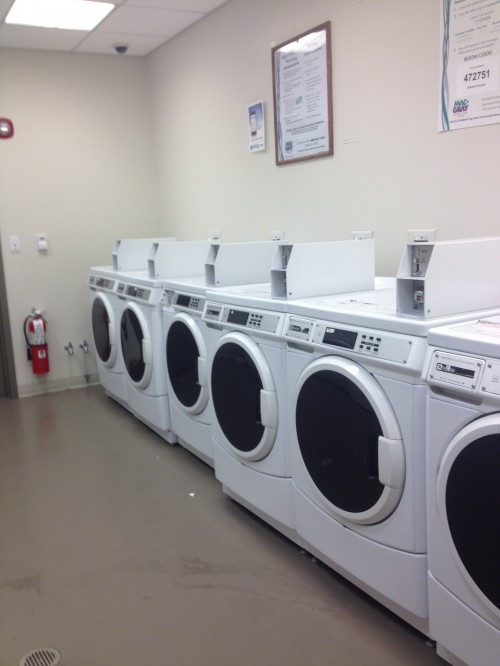Some students question whether the washing machines in the university basements are worth it, and where the money goes.
The financial string of the washers and dryers goes far beyond a student pushing in quarters or swiping their Ram Card to activate the load.
First, “The student swipes the card, and the processing goes through cbord,” said Business Manager John Kineavy. Cbord is a third party vendor that manages all of the university’s Ram Card transactions.
Suffolk charges $1.25 per load. In order to determine that price, Kineavy and other members of business management performed an analysis of schools in the surrounding Boston area, while also adding in operating fees and expenses.

Suffolk’s $1.25 has been in place, Kineavy said, “Since before I’ve been here, and I’ve been here six years.”
While other schools in the area were seen to be charging $1.50, $1.75, and other varying costs, it was just about, “What are other schools doing, do we need to move up, or do we stay where we are,” he said.
Suffolk continues to offer coin payment for laundry, setting itself apart from other universities in the area.
“We’re one of the only schools that allow coin-operator machines,” Kineavy said.
Suffolk keeps the coin method of payment due to the amount of funds it brings in.
“I don’t see taking away a method of payment as helping the student,” said Kineavy.
Describing the process after a student pays per load, Kineavy stressed that this industry is not aimed at making a profit.
“I don’t know what it is if there is any,” and Kineavy guesses it might go to a general fund elsewhere if there is revenue. “This industry is not aiming to make any money on laundry services,” but to provide the service at the cheapest cost possible, he explained.
Obvious expenses include factors such as electricity, water, vent cleaning, and campus card services through cbord.
Specific monthly rental fees for the university’s machines cannot be disclosed, he said.
“This is a very small and competitive business only getting two to three vendors bidding on a project, so if we print what they’re paying for the monthly rental, then their competitors are going to know what the fee is and how to beat it next time around,” Kineavy explained.
What is currently unknown is the profit that is brought in by operating the machines before expenses.
The price may not always stay at that low price because, “always is a very long time, nothing ever stays at that price. But, I will fight to keep it at 1.25.”
Last year, there were multiple instances where laundry services put a hiccup in the seemingly smooth process. Specifically, several of Miller Hall’s washers were out of order simultaneously.
If students had an issue with the equipment, such as a machine taking money but not giving back a cycle, the student can be reimbursed and credited to their Ram Card, even if it was paid with coins.
“Prior to last year, if a student had a problem, they would have to go back to the vendor … then the vendor issued a $1.25 check,” said Kineavy, who pointed out the new system of reporting to incident directly to the hall’s administration.
“The vendor does provide a good service, obviously there’s going to be some hiccups, and there have been a couple, but not yet in this semester,” said Kineavy, who hopes that is the way it will stay.













